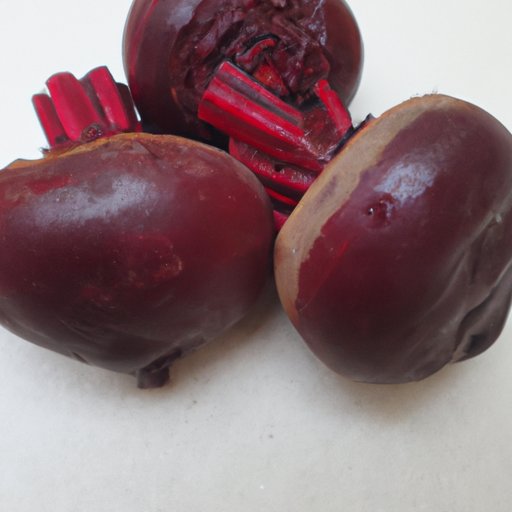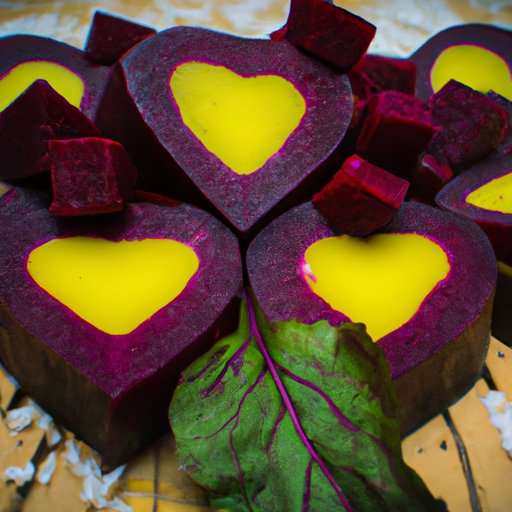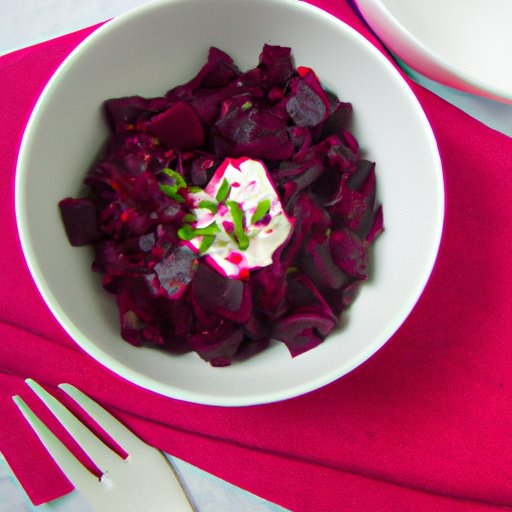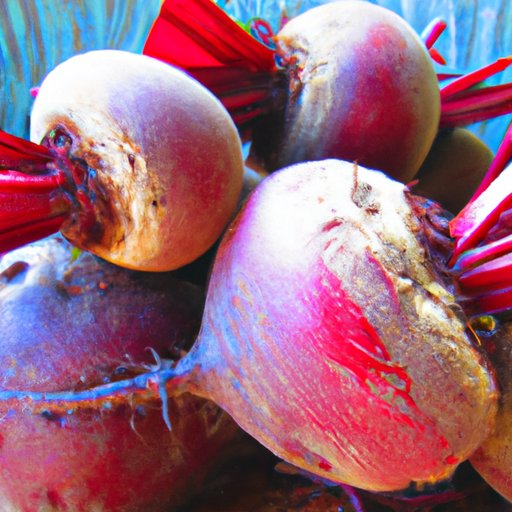Introduction
Beets are an ancient root vegetable that have been enjoyed for centuries. In addition to their sweet flavor, beets offer a range of important nutrients and potential health benefits. Eating beets can help lower blood pressure, reduce inflammation, and improve digestion. Plus, they’re a versatile ingredient that can be eaten raw, cooked, or juiced. Keep reading to learn more about the nutritional benefits of eating beets and how to incorporate them into your diet.
Nutritional Benefits of Eating Beets
Beets are a great source of several essential vitamins and minerals. They’re also high in antioxidants, which are compounds that help protect the body from damage caused by free radicals. Here’s a closer look at the nutrition facts for beets:
- Vitamin C: 20% of the daily value (DV)
- Folate: 17% of the DV
- Potassium: 10% of the DV
- Manganese: 8% of the DV
- Vitamin B6: 6% of the DV
- Magnesium: 5% of the DV
- Iron: 4% of the DV
Beets also contain small amounts of other vitamins and minerals, such as calcium, phosphorus, and zinc. Plus, they’re low in calories and fat-free, making them a great choice for those watching their weight.

How Beets Can Help Improve Your Health
Eating beets can help improve your health in several ways. Here are some of the most notable benefits:
Lower Blood Pressure
Beets are rich in nitrates, compounds that may help lower blood pressure. Nitrates are converted into nitric oxide in the body, which helps relax and widen your blood vessels. This can lead to improved blood flow and reduced blood pressure.
Reduce Inflammation
Beets contain betalains, pigments that have powerful antioxidant and anti-inflammatory properties. Studies have shown that these compounds can help reduce inflammation, which is linked to a range of chronic diseases.
Improve Digestion
Beets are high in fiber, a type of carbohydrate that helps keep your digestive system running smoothly. Fiber adds bulk to your stool and helps food move through your gut more quickly. This can reduce constipation, bloating, and other digestive issues.

The Role of Beets in a Balanced Diet
Beets are a great addition to any balanced diet. Here’s how you can use them to add more nutrition to your meals:
Versatility
Beets can be eaten raw, cooked, or juiced. You can also add them to salads, soups, and other dishes. Their sweet flavor makes them a great way to add more nutrition to your meals.
Low-Calorie Snack
Beets are low in calories and fat-free, making them a great snack. Enjoy them raw, roasted, or steamed for a simple, healthy treat.
Healthy Addition to Meals
Beets make a great addition to any meal. They’re a good source of vitamins, minerals, and fiber, so adding them to your plate can help boost the nutrition of your meal.

Cooking with Beets: Healthy Recipes
Beets are a delicious and nutritious ingredient that can be used in a variety of dishes. Here are three tasty recipes to get you started:
Roasted Beet Salad
Ingredients: 2 large beets, 3 tablespoons olive oil, 1/4 cup crumbled feta cheese, 2 tablespoons balsamic vinegar, 1 teaspoon honey, Salt and pepper to taste
Instructions: Preheat oven to 400°F (200°C). Trim the beets and toss with 2 tablespoons of olive oil. Place on a baking sheet and roast for 45 minutes, or until tender. Let cool slightly. Slice the beets and arrange on a plate. Top with feta cheese. In a small bowl, whisk together the remaining tablespoon of olive oil, balsamic vinegar, honey, salt, and pepper. Drizzle over the salad and serve.
Baked Beet Fries
Ingredients: 2 large beets, 2 tablespoons olive oil, 1 teaspoon garlic powder, 1 teaspoon smoked paprika, Salt and pepper to taste
Instructions: Preheat oven to 425°F (220°C). Peel the beets and cut into thin fries. Toss with olive oil, garlic powder, smoked paprika, salt, and pepper. Spread the fries out on a baking sheet and bake for 25 minutes, or until golden brown and crispy. Serve with ketchup or your favorite dipping sauce.
Beet Burgers
Ingredients: 2 cups cooked quinoa, 1 large beet, grated, 1 egg, 2 cloves garlic, minced, 2 tablespoons chopped fresh parsley, Salt and pepper to taste
Instructions: Preheat oven to 375°F (190°C). In a large bowl, combine the quinoa, grated beet, egg, garlic, parsley, salt, and pepper. Mix until well combined. Form the mixture into four patties. Place the patties on a baking sheet lined with parchment paper. Bake for 20 minutes, or until golden brown. Serve on buns with your favorite toppings.
Beet Juice and Its Potential Health Benefits
Beet juice is a popular beverage that has gained popularity in recent years due to its potential health benefits. Here’s what you need to know about drinking beet juice:
Weight Loss
Beet juice is low in calories and contains no fat, making it a great choice for those looking to lose weight. Plus, it’s high in fiber, which can help you feel fuller longer.
Detoxification
Beet juice is rich in antioxidants, which can help protect your cells from damage caused by free radicals. This can help your body detoxify itself and stay healthy.
Improved Blood Flow
The nitrates in beet juice can help improve blood flow and reduce blood pressure. This can lead to better heart health and increased energy levels.
Growing Beets at Home: A Guide to Healthy Eating
If you’re feeling adventurous, you can even grow your own beets at home. Here’s what you need to know:
Soil Requirements
Beets prefer well-drained, nutrient-rich soil. If your soil is sandy, add some compost to help retain moisture. The soil should be slightly acidic (pH 6.0–7.0).
Planting and Harvesting
Beets can be planted as soon as the soil can be worked in spring. Plant seeds 1 inch deep and 2 inches apart. Thin to 4–6 inches apart when seedlings are 2–3 inches tall. Beets are ready to harvest when the bulb is 1–2 inches in diameter. If left in the ground too long, they can become woody and tough.
Storage Tips
Beets should be stored in the refrigerator in a plastic bag or container. They can last up to two weeks if stored properly. If you plan to freeze them, blanch them first to preserve their color and texture.
Conclusion
Beets are a nutritious root vegetable that offer a range of health benefits. Eating beets can help lower blood pressure, reduce inflammation, and improve digestion. Plus, they’re a versatile ingredient that can be eaten raw, cooked, or juiced. You can even grow your own beets at home. So why not try adding beets to your next meal? You’ll be glad you did.
(Note: Is this article not meeting your expectations? Do you have knowledge or insights to share? Unlock new opportunities and expand your reach by joining our authors team. Click Registration to join us and share your expertise with our readers.)
